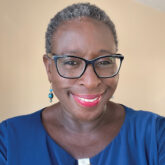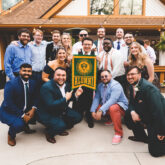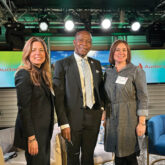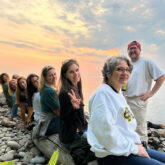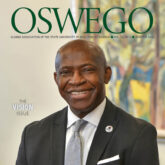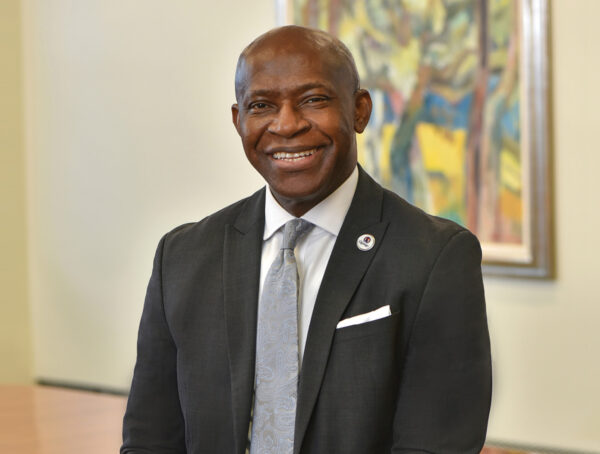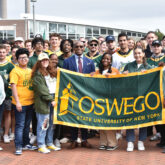One Saturday afternoon, Martha Swan ’81 wandered into a SUNY Oswego campus lecture that would set her life’s path.
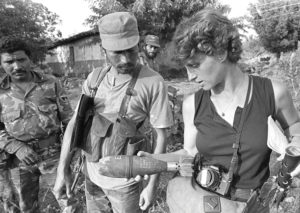
Swan in Santo Tomas del Norte, Nicaragua, in 1986. The village suffered mortar attacks in clashes between Nicaraguan soldiers and contra rebels along the border with Honduras.
The lecture was about the importance of being bilingual, and it was presented by the late Dr. Diana Balmori, associate professor of history, an emigré from Argentina who taught at SUNY Oswego from 1974 to 1983.
“It was my amazing fortune that I just happened to walk into that lecture,” Swan said. “At that point I wasn’t taking a language, but I left there determined to become bilingual.”
From that moment was born a career as a Spanish teacher, as well as the spark of a lifelong spirit of activism that has spanned the Americas and come to rest most recently in the Adirondack Mountains. In addition to teaching Spanish in the tiny Adirondack district of Newcomb Central, Swan’s extensive resume as an educator and advocate for human rights includes her latest project—Friends in the Adirondacks, a derivative of her John Brown Lives! program—founded to promote social justice through the exploration of issues, social movements and historic events.
Like Swan’s career and many of her projects, Friends in the Adirondacks started with a pivotal encounter; this one while heading to her car outside of the maximum security Clinton Correctional Facility in Dannemora, N.Y., in 2016.
“It was a blistering hot day, and three people—it looked like a mom and two grown children—were trying to find the visitors’ entrance, and the mom was frantic,” Swan said.
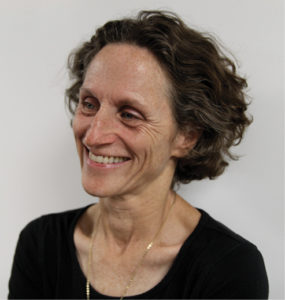
Martha Swan ’81
Swan directed them on how to get inside the massive facility. As Swan was driving away, she saw that the family was already back outside. She stopped to ask if everything was OK. The family shared that they had traveled more than 300 miles to see a family member, but had missed visiting hours.
Swan said she offered the family her home while they figured out a plan, but they declined her hospitality.
Swan drove away; then regretted not offering her telephone number, just in case. She turned her car around to see if they were still there, but the family was gone.
“I felt awful that I couldn’t do anything for them,” Swan said. Those three people she met that day, she said, are among the multitude of families who travel to the North Country to visit inmates every year. “The Adirondacks is ringed with prisons. It’s a complicated and delicate topic for people to pull back the curtain and take a look at how we have built our economy on mass incarceration, and really consider how the local people, the inmates and their families are impacted.”
It was that roadside meeting that spurred Swan, along with co-founder of Friends in the Adirondacks Soffiyah Elijah, to build a network of individuals and families in the North Country to provide hospitality and other kinds of support for visitors. Families who are too far away to easily visit can request to have a local visitor sent into the prison to check up on a loved one.
“My organization, Alliance of Families for Justice, supports families with incarcerated loved ones in a myriad of ways,” said Elijah, who is based in New York City. “Martha and I agreed that our organizations should collaborate to expand the support that could be provided.”
It was an easy alliance to make, Elijah said.
“Martha’s generosity of spirit, selfless commitment to justice and deeply reflective insights serve to make her a calm force with which to reckon,” Elijah said. “Her devotion to building a better world is both infectious and inspiring.”
Not only is the mission of Friends in the Adirondacks part of Swan’s personal definition of a “truly welcoming Adirondacks,” it is, more instinctually, a compassion for others that she traces to Dr. Balmori and her time at SUNY Oswego, she said.
“I wasn’t necessarily paying attention to the world, until I was a student at Oswego,” Swan said. She choked up with emotion as she talked about the moment her ambitions first intersected with activism: Once she began studying Spanish at SUNY Oswego, she found herself volunteering for organizations, including the Syracuse Peace Council, based in her hometown. That led to helping refugees from South America, particularly those escaping violence and repression in Guatemala and El Salvador.
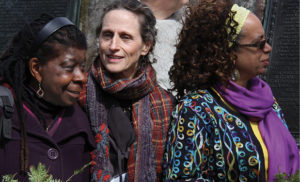
Swan (center) attending John Brown Day in 2016 in Lake Placid, N.Y. She is the founder of John Brown Lives!, an organization dedicated to social justice and education.
“I was all of 20 years old,” she said. “I was so privileged to be this 20-year-old kid who knew so little, to translate for them, to tell their stories when they so desperately needed it.”
Later, Swan would live in Central America. Eventually, her path took her to New York City and ultimately—the mountains of her home state, where she became development director for an Adirondack environmental organization. She continued teaching and founded the John Brown Lives! organization after a visit to Harper’s Ferry, W.V., where history captured her imagination.
“John Brown was committed to supporting those who are enslaved, and ending slavery,” Swan said. “Why has he been vilified by history? I was compelled to change this. This history needs to be known.”
Slavery is an issue that remains relevant today, she said, and one that has influenced her commitment to others. Swan’s organization based on Brown’s namesake has offered educational events ranging from film screenings to community readings to concerts, in addition to the annual John Brown Day—a day dedicated to human rights and liberation held at the John Brown Farm State Historic Site in Lake Placid, N.Y.
Just as pivotal encounters have shaped her pursuits, so have her students and her love of language.
“As a teacher I believe the study of language is just the vehicle for inquiry, discovery and engagement,” she said. Her current Newcomb students have helped her to shape a new direction of activism. Swan most recently joined the National Oceanic and Atmospheric Administration’s Planet Stewards Education Project, which provides educators working with elementary through college-aged students with the knowledge and resources needed to respond to environmental challenges.
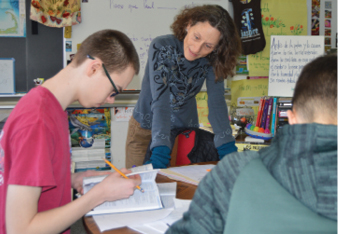
Swan working with students in the Newcomb (N.Y.) Central School District
Photo: Autumn Goerner
“We’re studying things like marine sanctuaries, in Spanish—and learning about what’s damaging our oceans,” Swan said. “It’s something the students are interested in, and it’s meaningful to me. And who knows? Maybe I’ll learn how to scuba dive.
“I tell my students: Learning Spanish—any language, really—will enrich your life beyond any measure you can ever imagine in terms of the friends you’ll make, the experiences you’ll have and your understanding of the world,” Swan said.
“It did exactly that, for me.”
—By Eileen Moran Crandall
More from Featured Content
Vision for the Future
VISION for the Future Peter O. Nwosu began his tenure as the 11th president of SUNY Oswego, building on the solid …
Envisioning the Potential in All Students
ENVISIONING the Potential in All Students Educator donates $2 million in recognition of his Oswego education, in support of future teachers Frank …
A Vision of Support
A VISION of Support Award-winning principal makes an impact on her school through her positivity and commitment When Nicole Knapp Ey ’02 …

